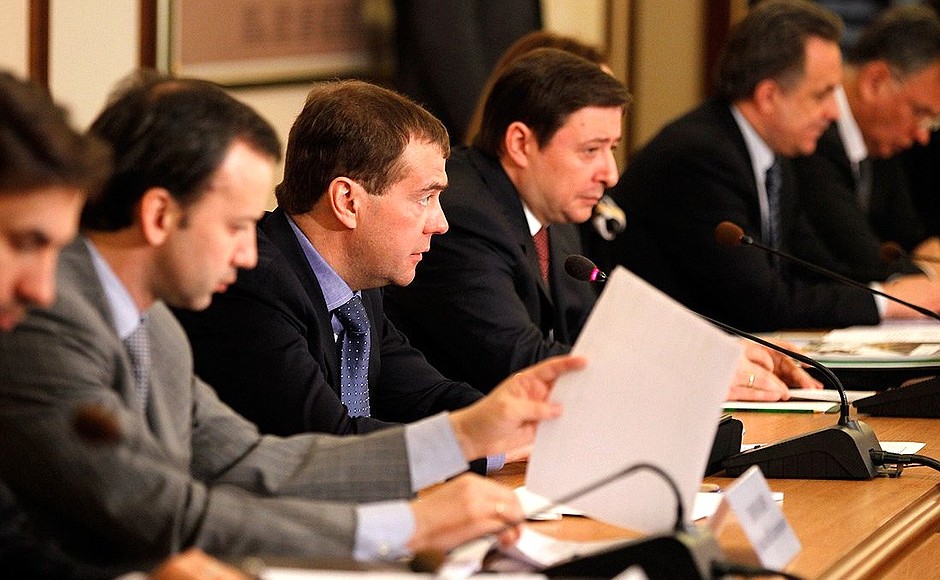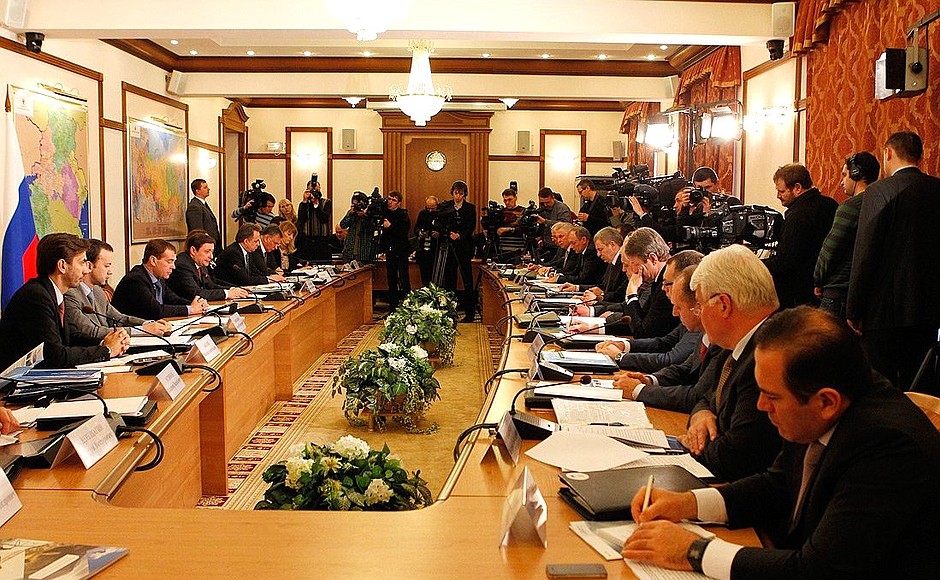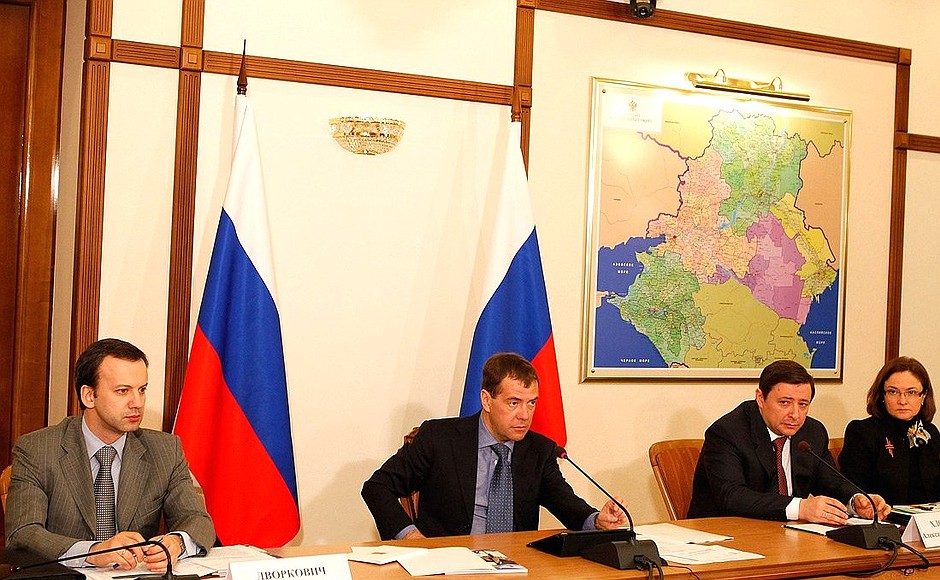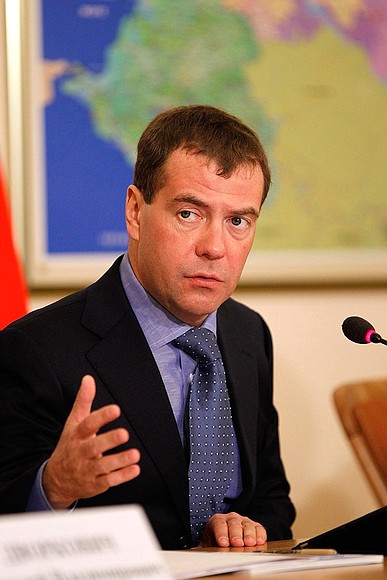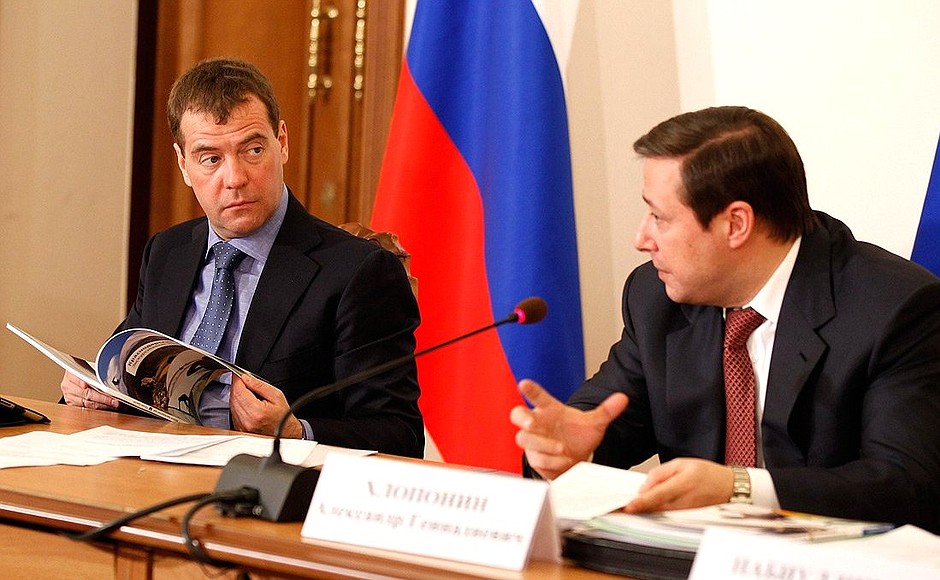***
President of Russia Dmitry Medvedev: Good afternoon, colleagues.
Today we are going to discuss the development of domestic tourism in our country, including the prospects of a tourism cluster in the North Caucasus.
The first time we had a major, comprehensive discussion on this subject was almost four years ago, in 2008 in Uglich, and I issued instructions following that meeting. Some of those instructions have been implemented, but to be perfectly frank, the situation with domestic tourism remains far from satisfactory.
Measures to promote tourism are being implemented as part of a targeted programme. We are establishing special economic zones – the so-called recreational areas, including at Lake Baikal, in Altai, the Primorye Territory and the Kaliningrad Region, as well as here in the Caucasus. One area gaining popularity is adventure tourism in the most beautiful parts of our country, such as the north, Siberia and the Far East.
No doubt the major events that will be held in our country – I mean the Universiade in Kazan, the World Athletics Championship in Moscow, the 2014 Winter Olympics in Sochi, the 2016 World Hockey Championship and the 2018 FIFA World Cup – will be a huge boost to domestic tourism.
However, this is just not enough. Moreover, it is a mistake to make domestic tourism entirely dependent on major sporting events because no matter how many of them we host, they remain isolated events, highly complex and requiring a great deal of energy and funding, whereas the flow of domestic tourism must continue without interruptions, all year long.
”Major events that will be held in our country – the Universiade in Kazan, the World Athletics Championship in Moscow, the 2014 Winter Olympics in Sochi, the 2016 World Hockey Championship and the 2018 FIFA World Cup – will be a huge boost to domestic tourism.“
Unfortunately, progress in the last four years has been insignificant. According to international experts, Russia is in the 59th place worldwide in terms of fulfilling its tourism potential. At the same time, we must bear in mind the current situation in Russia: it has the biggest territory and no other country on the planet can boast such a diversity of attractions but only two million foreign tourists come to Russia every year. In addition, we are one of the world leaders in the number of natural and cultural heritage sites. Therefore, we have all the basic prerequisites for the growth of tourism.
According to the World Tourism Organisation, Russia can annually play host to at least 70 million Russian and foreign tourists. I draw your attention to the fact that that now we have two million foreigner tourists. The overall number of tourists in 2011 was about 37 million, which means that it can be at least doubled.
The reasons for this lag are generally clear. They include obsolete or excessively expensive hotels, poor transport infrastructure, not very high quality of service, complicated visa procedures and out-dated immigration regulations. Some of these issues can be resolved fairly quickly, while others will require large-scale investments.
We all realise the tourism industry’s potential. It is one of the key sectors in the world. In terms of revenues, it is the world's third largest, behind the oil industry and the automotive industry. That’s the order: hydrocarbons, followed by cars and then by tourism. In 2010, the world’s tourist flow came close to a billion people; tourism generates 9% of the world’s Gross Domestic Product and jobs. What is particularly important for us is that these jobs are mostly in small and medium businesses.
The challenge is to use all our opportunities and our potential in full, and to provide support for the tourism industry in a wide range of areas. In this context, I will issue instructions to the Government to decide on the support mechanisms for the tourism industry in the coming years so that we can determine ways to remove obstacles to the rapid development of tourism and ensure the implementation of measures on information support for tourism services in the domestic and foreign markets.
Soon after the formation of a new Government, we will plan our further moves and decide on the ways to tackle these challenges, decide who will be responsible for the results and what agencies will be involved.
”According to the World Tourism Organisation, Russia can annually play host to at least 70 million Russian and foreign tourists. Now we have two million foreigner tourists. The overall number of tourists in 2011 was about 37 million, which means that it can be at least doubled.“
It is clear that the regional authorities are greatly interested in attracting tourists, and we have several regional leaders with us today, not only those who represent the North Caucasus and Southern federal districts, but other federal districts as well. There should be a federal agency responsible for the removal of barriers at the federal level, the formation of a common information space and the implementation of appropriate economic programmes. Who can be in charge of this? I emphasise again, we will decide on this in the near future.
Now a few words about the North Caucasus tourism cluster, the creation of which began almost two years ago. Its highlight is alpine spa resorts and skiing venues. There is no need to go over the huge importance of this project for the socio-economic development of the entire region. A great deal has been achieved already for the formation of a consolidated regulatory framework (we have been able to restore order in this area) and to attract investors and partners. A mechanism of state support for the project has been designed and amendments to the Federal Law on Special Economic Zones in the Russian Federation have been introduced, so that now this law allows us to address highly complex tasks. Previously, such a mechanism did not exist. Tax and customs privileges are stipulated for the residents of the tourism and recreational economic zones in the North Caucasus.
We can see the benefits of these efforts: the construction of the year-round mountain resort Arkhyz is in full swing. I hope that the resort will open its doors to visitors in the winter of 2012–2013.
Other resorts are also under construction. Our colleagues here will tell us what has been done. The length of the ski slopes will be very significant, which in itself will make a great attraction. But there are certain problems, which I hope we will focus on today.
First, the resorts must have modern infrastructure to make them accessible; we must build world-class roads, railways and airports. This is the most important prerequisite for attracting tourists to the North Caucasus and the Caspian Sea.
In this regard, I would like to instruct the Government to determine the tourism cluster’s needs in the engineering, energy and transport infrastructure and to prepare proposals for the construction timeframe and the sources of funding.
We have at least six existing airports under reconstruction, and they can be used to develop this region. The main cities here include Krasnodar, where this meeting is being held (it is the largest regional centre but the airport needs to be upgraded), Maikop, Mineralnye Vody, Nalchik, Beslan and Makhachkala, as well as other cities.
”The cluster approach to tourism development should not be limited to the North Caucasus. All appropriate solutions can be applied anywhere in our country.“
Four new airports need to be built. We must also decide which of these airports can become transportation hubs (i.e., points of major passenger and cargo transhipment), considering that the existing airports’ capacity in the North Caucasus is about 20,000 people per day. In order to implement this major alpine tourism project, the flow of passengers must be increased at least five times, to 100,000 people who will travel through the North Caucasus airports every day.
Another challenge is to attract investors. We have already signed legally binding agreements with investors from France, Korea and Singapore for a significant amount, over $3 billion, and with Russian investors for a comparable amount. I would like to use this occasion to thank all investors, both Russian and foreign, who have made a serious commitment and have already started working in the south of our country. For us, it is very important that they have taken on such obligations and that they have chosen the south for the realisation of their plans.
However, we must move forward, we must minimise financial risks, including by providing long-term state guarantees for investors. I think that such a decision could be taken at the government level.
Clearly, the cluster approach to tourism development should not be limited to the North Caucasus. All appropriate solutions can be applied anywhere in our country, if only these solutions attract tourists. Therefore, it is necessary to prepare general criteria of organising this effort. We must understand, with due regard for each region’s conditions, what businesses and investors need to put their money and energy into this project. In fact, this should become the focus of federal agencies’ efforts.
Let's get to work. I hope that the recommendations produced at today's meeting will contribute to the development of the tourism industry in the North Caucasus and around the country.
<…>
